#london prizefighting
Explore tagged Tumblr posts
Text
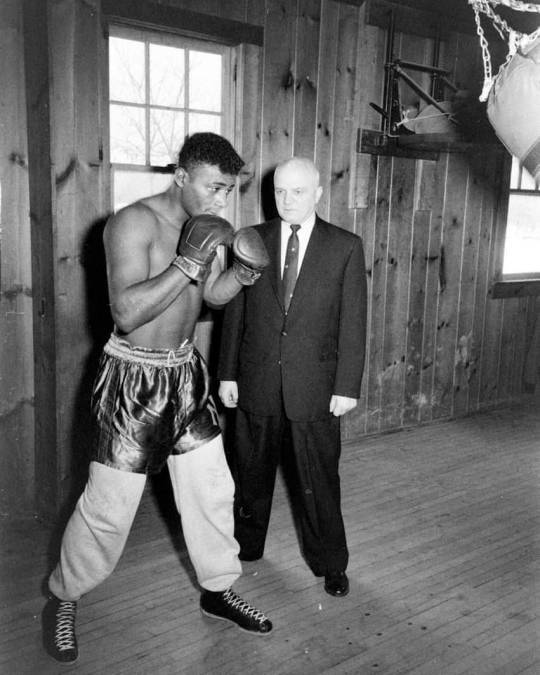
Heavyweight champion Floyd Patterson and his trainer and manager Cus D'Amato. For years D'Amato was accused of protecting Patterson from a formidable group of top heavyweight contenders.
#alastair devlin#anything to win#atw#bare knuckle#bare knuckle boxing#big al devlin#bkb#book#boxing#devlin#anything to win ultimate fighting manual#ultimate fighting manual#london prizefighting#pugilst#prize fighting#prize fighter#pugilism#spartan bare knuckle fight club#spartan bare knuckle#bare knuckle fighting#bare fist#fighting manual#training manual#martial arts#mmafighter#mma#street fighting#street fighter#fight#fighting
3 notes
·
View notes
Text
the parent trap
CHAPTER THREE: en garde
The boys come to blows. (With practice épées, but in their minds, it’s equally as serious.)
⁂
Oh, yes. Remus is settling into camp just fine.
Specs and Tie-dye—he learns their real names are Teagan and Nick—were, to his absolute delight, absolutely terrible at cards and unflaggingly good sports about it.
Even when Remus managed to win Nick’s prized nail polish, contraband stolen from his sister, he’d simply shrugged and congratulated Remus on a good game. Remus had celebrated the occasion by painting his nails a sickening shade of green chrome.
(He, of course, generously let Nick paint his own nails, though he’d chosen a ridiculously bright highlighter yellow. It was kinda cool, really; all the bees in camp seemed fascinated by the color, which had Nick regretting his decision by lunch the next day.)
The first week passes in a blur of finally managing to memorize everyone’s names, though he almost never used them, getting his bed as close to a nest of dirty clothes and his blankets as possible, and finding the kitchen window with the loosest latch so he could sneak into it after hours and steal contraband.
The best part: his counselor, when Remus had swaggered back into the cabin with armfuls of popsicles, had simply shrugged and gone back to writing a letter to his girlfriend back home.
Summer camp, he writes in a letter home to Patton and Virgil, is going AWESOME.
⁂
Now here’s a sport that Roman can really thrive at.
None of this nonsensical American football—no. Fencing is where Roman will make his reputation. He’s rather pleased with himself, actually—fencing was cool. Maybe his success at it would, by proxy, make him cool.
“Halt!” Marvin cries as Roman’s landing a perfect hit at the dead-center of the chest, and Monroe falls on his back to the cheers of the rest of Maple.
Monroe takes off his helmet, grinning up at Roman. “Touché!”
Roman reaches down to help him up as Marvin Jr. cries out, “All right, excellent, kids! The winner and still undefeated champ from London, England—Mr. Roman James!”
Marvin Jr. takes his hand and raises it in the air, as if Roman’s some kind of prizefighter, and the rest of Maple cheers and claps for him, and Roman feels like he’s on top of the world. He turns to rush up to his cabin-mates, whose hands rain down on his back in approval.
He’s distantly aware of Marvin saying, “Do we have any challengers? Oh, come on, fellas…”
Roman takes a moment to drink from his water bottle.
“Awesome hit, Roman!” Asher says, patting him on the shoulder.
“Yeah,” Monroe says, “how’d you get so good at this stuff anyway?”
Roman shrugs, pretending at humility. “I did theater in school—the stage fighting’s stuck with me, I suppose.”
��Well, it’s wicked,” Asher says, then, “that’s right, isn’t it, wicked?”
“Yeah,” Roman says, grinning, “wicked” and they high-five.
“All right, James, you’ve got a challenger!” Marvin calls.
“Here I go,” Roman says, slightly muffled by his helmet, and he turns to face his competitor; suited in green-and-white, helmet and foil already in place, ready to begin the match.
“Go, Roman!” Maple cries as they meet in the center of the makeshift ring, foils clacking briefly together.
“Fencers ready?” Marvin asks. Roman nods.
“Prête—allez!”
The opposite fencer attempts some fancy maneuver with kicking up the foil from the ground, managing to catch it and swirl it around in some embellishment.
“En garde—Fence!”
And they’re off.
The challenger’s thwacking at his foil repeatedly, as if that’ll somehow get Roman to trip up his guard; he parries all of them easily, keeping his footing as the challenger charges forward.
The challenger steps out of the ring onto woodchips. Roman lunges, attempting to land a hit just to end the match, but the challenger bounces off of a tree, and Marvin doesn’t call foul even though he’s clearly out of bounds.
Then the challenger slashes his foil through the air, and Roman dodges—again, and to the left—Roman spares a look at Marvin, who still isn’t calling foul, and just barely manages to block the stranger’s foil from hitting a passerby.
“You could’ve hurt someone!” Roman says, furious.
“He wasn’t looking where he was going!” The challenger scoffs, and the match begins to grow fierce.
This challenger clearly has no semblance of strategy—their foil bounce off each other, each parrying each other’s every attempt at getting close enough to land a hit—and Roman’s back hits a wooden post.
He spins out of the way just in time for the foil to land in the post.
Right where his face would have been.
“You seriously could hurt someone!” Roman yells, and clearly Marvin isn’t about to bother stepping in—he plants his hands and cartwheels over a haybale, just to gain some ground away from this—this hacking, whirling dervish of a maniac.
He has the challenger with his back to the haybales now—he attempts to conduct the game legally, though it makes the challenger yawn, putting his face in front of the mask—and Roman snarls, infuriated by this.
The challenger takes immediate advantage, and attempts to disarm him—the foil flies in the air, hovering for an impossibly long moment—Roman runs up to the cabin, leaning over the railing and , gaining the upper ground, hand in the air, and he manages to seize the handle just in time.
“Nice catch!” The competitor says, before he promptly begins chasing Roman up the cabin stairs.
“You’re mad!” Roman yelps, twirling out of the way and doubling back, “completely barking mad!”
“Thanks!” The challenger says brightly, as though Roman’s paid him the highest compliment, and then sidesteps the foil, plants his hands on Roman’s chest, and gives him a great, hard shove.
Roman shrieks as he falls over the railing—he braces himself for a hard fall—but—
SPLASH!
He surfaces—not that the water’s very deep—and coughs, shocked, the wind having been knocked out of him. He’s landed in some kind of trough—really, why on earth was there a trough there? He��s grateful—he could have broken a bone from a fall of that height!
He could have gotten really badly hurt! Not just the fall—during at least five different points in that match!
But Marvin does not seem to care in the slightest.
“O-kay, that was quite a show!”
Marvin’s approached the green-suited competitor, hoisting his hand in the air.
“I think we’ve got ourselves a new camp champ—from California, Mr. Remus Parker!”
“He cheated!” Roman protests, furious, and finally manages to extract himself from that ridiculous trough—really, who just put water in some random receptacle like that?!—and shakes off the excess water as best he can, though the suit’s quite waterlogged.
But Roman’s protests—and the protests of his cabin—go unheard over the raucous screaming of the Pines; Marvin Jr. is too busy looking at his clipboard to register this complaint.
Roman storms over to put away his foil, taking off his helmet and tucking it under his arm.
“This is absolutely ludicrous,” Roman says, to the loud agreement of Asher.
“He shoved you in the trough!” Asher declares, pointing over his shoulder, where the cheater must be standing. “That’s gotta be against the rules!”
But all fell on stubborn ears; at last, Marvin Jr. looks up from his clipboard, only to say in a mild tone of voice. “All right, boys, now shake hands.”
With a dirty rotten stinking no good cheater?! Marvin Jr.’s out of his bloody mind!
“Come on, boys, be good sports. Shake hands.”
Roman, with a great roll of his eyes, turns around just in time to hear a loud, nasal sigh.
And then he jerks back in shock.
It’s like they’ve stuck a mirror in the ground.
The mirror image pulls back too, eyes bugging out, but it’s like it’s Roman. Same freckles splashed across his cheeks from spending time in the sun; same height, same brown eyes, same brown hair, even the same stubborn cowlick!
But then, it’s like a funhouse mirror, on second glance; the cheater (the cheater! yes! this boy cheated!) has a ghastly streak of white hair throughout his too-long hair; unkempt where Roman was neat, exaggerated in expression where Roman was calm, and, oh yes, a cheating cheater where Roman was honest!
Roman swallows, but he sticks out a hand.
After a moment’s hesitation, the cheater sticks his out. Yes, that’s just the same, too, except, Roman notices with distaste, that the cheater has bitten his nails down to the quick, his chrome nail polish chipped. And, ugh, how is there so much mud caked under them?! Roman’s are neatly trimmed and clear.
But Roman clasps it to shake all the same, real and not a mirror at all; it’s damp, like his, but warm, shockingly so.
The other boy—Remus Parker, hadn’t Marvin said?—yanks his hand back as quickly as he can manage, mussing his already messy hair.
“Why’s everyone staring at us?” He says, loud.
“...Don’t you see it?” Roman says.
“See what?!” Remus says with a scoff and a dismissive shake of his head.
“The resemblance between us!”
The other boy’s eyebrows shoot up his forehead.
“Resemblance?” Remus repeats. “Between… you and me?”
Roman nods, still stricken; yes, there’s that smirk on the other boy’s face, the same on Roman’s practiced in the mirror before, the one that he tries to use to demonstrate nothing anyone ever says bothers him.
“Let me see,” Remus says, mockingly putting a thoughtful finger to his temple. “Turn sideways.”
Roman huffs out a breath, but pivots to display his left profile; Dad always says that statistically, someone’s left side is almost always going to be their good one.
“Noww the other way.”
Roman rolls his eyes and acquiesces. He feels like he’s in a police procedural to get his mugshot.
“We-ell,” the other boy drawls. “Your eyes seem a bit crossed—you don’t have to try that hard to look at me, I’m right here.”
Roman clenches his fists, tops of his ears burning, as Remus Parker’s cabin mates laugh at him.
“That nose—well, don’t worry, I bet you’ll grow into it.”
Roman resists the urge to cover his nose with his hand.
“And your teeth are like someone shoved a crumbling Jenga tower in there, but hey. That’s Brits for ya, innit?”
And an awful attempt at a British accent too! Roman’s positively fuming.
“But do you want to know the real difference between you and me?” Remus says.
“What?” Roman says snidely. “That I know how to fence and you don’t? Or is it that I have class and you don’t? Take your pick.”
“Why I oughta—”
Roman would be delighted by this utterly American line if it hadn’t been accompanied by this brute clenching his jaw and taking a closer step. As it is, Roman sets his jaw and takes his own step forward.
“Boys, stop,” Marvin Jr. is saying in the background, and Roman is about to take another step forward, and damn that he doesn’t know how to enter fisticuffs when a hand comes down on each of their shoulders.
“Now Remus—”
Roman glowers at Marvin. He doesn’t have that ghastly streak of white through his hair!
“Roman—I mean—”
Remus takes a moment to pull a grotesque face at Marvin before returning his attention to Roman.
“Now Roman—Remus—I-I mean—oh, whoever you are, it’s time to break up this little love fest—”
The boy snarls at him���snarls! Like some kind of animal!—and Roman has to resist the urge to snap right back at him, even as they’re jostled away from each other.
“Whoa,” Asher says, to the general mutterings of agreement of cabins Pine and Maple.
⁂
The discussion of the fencing match and the shock of the identical combatants carried over, Roman found, through lunch, dinner, and even during pre-bedtime downtime when Roman was trying to write a letter to home with absolutely zero mention of it.
He’s absolutely sick to death of this conversation. And yet.
“I mean, don’t you think it’s weird?” Asher pushes.
Roman presses down a little too hard on his pen, where he’s trying to describe the activities he’s gotten introduced to since arriving at camp. I’ve found I’m rather a dab hand at kayaking…
“For the thousandth time, yes, of course I think it’s odd,” Roman says wearily. …spent the whole morning that day in the lake, which was very beautiful (sketch enclosed)...
“You’ve seriously never met this guy before.” another cabin mate pipes up.
Roman rolls his eyes, carefully sorting through his sketches to select the most picturesque for his father. “I’ve seriously never met him before.”
“Nothing? No mention of a weird American cousin or anything like that?”
“I don’t have any cousins our age,” Roman says, settling on a landscape that shows the sun dappling beautifully through the leaves and landing on the glittering lake. “The closest age cousin I’ve got is my dad’s age, and he’s not even technically my cousin, he’s my dad’s cousin.”
“Weird,” Asher says with a shake of his head.
“Weird,” Roman agrees, hoping he’ll be able to resume his letter in peace now that they’ve hashed it out for the billionth time.
…I’m getting along just fine with my cabin mates, and my counselor hardly seems to have a care about what shenanigans some of them get up to—breaking into the kitchen for sweets and the like.
It seems to be a bit of a tradition to do that kind of thing anyway; I guess the reasoning is if we do small bits of rebellion, we won’t turn our attention to absolute chaos. Not that I’ve been joining in outside of enjoying the occasional contraband snack, I assure you (so long as you don’t count swiftly establishing myself as the predominant poker talent in the cabin)…
“...dunno, what are your theories, then?” he can hear Asher say to another kid in the cabin, as if Roman isn’t even there. Roman grits his teeth and presses his pen back to paper, perhaps a bit firmer than he did before.
…be sure to tell Grandfather that his new deck of cards has come in handy and I thank him again for the gift. I’ve taught them a few new card games, too, and there’s rumors of them trying to teach me one—have you ever played something called Egyptian Rat Screw? I guess it’s fairly similar to Beggar-my-neighbor. Americans, as usual, have their own take on things. That might be the plan for the evening, if I don’t have any takers for poker this evening.
But that’s proven rather popular. People seem to think they can defeat me.
Someone storms in from outside, clearly in the midst of a rant.
“—my whole allowance, it’s absolutely insane—”
“Who took your allowance?” Asher asks.
“That Remus Parker kid,” he says. “He’s bleeding everyone dry. He’s like a freak poker prodigy.”
A smile creeps across Roman’s face. “Is he now.”
There is a great turning of heads to Roman’s bunk.
More specifically, there is a great turning of heads to Roman’s cubby of pride, where he has placed every trophy he’s wrought from every poker game he’s played in camp.
Every undefeated poker game.
“Say, Roman,” he says slowly. “I don’t suppose… you’d want to win it back for me, would you? I’d get you whatever you wanted from the kitchen. All summer long, even.”
Everyone looks very tempted by that offer. Let alone Roman, who is always a little nervous about the potential of being caught out in the kitchens anyway.
“C’mon, Roman, please,” Asher urges. “I know you want to. Don’t you want to get back at that dirty stinking cheater?!”
That does it.
“Yes, of course, let me just finish this so we can drop it in the post box on our way there—”
He turns and quickly jots off the ending line of his letter, then signing it Love from, Roman James in a great swooping signature that his dad had helped him perfect.
Off to win what will surely be a rollicking poker match!
⁂
Remus tsks in delight as he extends his arms, having to use more than his hands to be able to pull in the sheer quantity of quarters, dollars, chewing gum, candies, nail polish, and—the most sacrosanct—a key to get into the kitchens someone filched from some stupid counselor! No more jimmying open windows for Remus! That will definitely make fulfilling his nighttime cravings easier.
“Sorry, gents,” he says smugly and not at all apologetically as the majority of the Catalpa Cabin’s riches tumble into his lap.
There’s a great chorus of rumblings as Remus begins to sort the dollars from the quarters, and the food from the money, ostentatiously fanning himself with them. “Any more takers?”
The door to Pine Cabin opens, and Remus cranes his neck over the crowd of spectators that have crowded into the space; he snorts at the sight.
“No refunds, Monroe,” he says. “Should’ve known better than to bet all your money on a two-pair.”
“He’s not going for a refund,” a very, very familiar voice rings out over the flock of Maple Cabin.
They all part to reveal Remus’ clone from an alternate, much dweebier universe.
“But I’ll give it the old college try.”
Remus snorts, pushing his sunglasses up onto his head.
“Sure, James,” he says. “Take a seat.”
Roman James tucks himself tidily atop the bed, hands folded.
“Hold’em? Omaha? Seven Card Stud?” Remus fires off.
“We’ll do a classic Texas,” Roman says.
Remus snorts. Figures. He probably doesn’t even know to ask if they’re playing Short Deck or not.
“Fine,” Remus says, beginning to shuffle, but Roman makes a sharp noise of protest.
“After your stunt at the fencing grounds? You’ll have to forgive me to think you’re not stacking the deck in your favor.”
Remus shrugs, unoffended. He probably would if he knew for a fact he’d get away with it.
“Someone else will have to deal us in, Parker.” Roman says pointedly.
“Fine,” Remus says, settling his sunglasses back on his nose. With the glass root beer bottle beside him, Remus probably cuts what Virgil would call an intimidating figure.
He hands the cards to the first set of hands that take them. It turns out to be someone from Catalpa; probably good. He doesn’t want James to cry cheater again if someone from Pine had dealt them both in.
Remus can play this in his sleep. Classic Texas Poker, it’s a shoo-in. Clearly he’d bruised more than just James’s body when he’d shoved him in that trough; he’d bruised his ego.
Shame that James was about to stake his honor on the game that Remus had been playing practically since he was born.
The crowd around them is heavy; Pine, stacked up behind Remus, and Maple, stacked up behind Roman, seemingly as a matter of Cabin Pride or principle.
The real interesting read of the sway were any Catalpas—even a few of the older boys from Rowan and Sequoia filter in after a while—switching their vantage points from one to another, whispering to each other and gasping appropriately when things get added to the pot.
Remus gets the card. The. Card. Just the one he needed.
Remus smirks at the sight.
“Tell you what, James,” he says. “Let’s make things really interesting.”
Roman arches an eyebrow.
“Loser jumps into the lake after the game.”
“Excellent,” Roman says, examining his cards.
“Butt. Naked.”
There’s a chorus of sniggers erupting from the flock of pre-teenage boys.
A slow smile curls over Roman’s face. “Even more excellent.”
Remus grins back. Oh, when that stuck-up English prude has to go down to his skivvies, or whatever screwed-up word they use for underwear…
“Start stripping, James,” Remus says smugly. He smacks his cards against the table, face-up.
“Straight! In. Diamonds.”
Remus smiles.
“Oh, you’re good, Parker,” Roman begins to hum, a tune that Remus thinks he’s probably heard somewhere…
“But not good enough.”
Remus’ smile drops.
“In honor of my homeland,” Roman says. “God save the Queen, Parker.”
Roman flips around his cards to display a royal flush, covering his smiling, humming mouth.
Of spades.
No way, Remus thinks, furious—but he’s the one who passed off the cards to Catalpa, there’s no way he could have—
Remus forcibly shoves down any anger. He can use that later.
To come onto his turf, to challenge him at his thing, all because of a measly little shove?
This meant war.
“Well,” Remus says, removing his sunglasses, and puts his biggest grin on his face.
“Anyone going to give me some music for this? No?”
He dramatically whips off his green, Walden-branded bomber jacket, tossing it in the general direction of his bunk.
“Come on then, boys, time for me to put on a show! Probably a better one than his lily-white pasty ass would’ve given you!”
And so Remus begins to sprint to the dock, tugging off his shirt in the process, to the great chorus of preteen footsteps behind him, laughing and whooping the whole way down.
⁂
It’s difficult to see their way down to the lake, but fortunately some of the boys from Sequoia had gathered candles so, at least, Roman wasn’t tripping over his own feet on his way down there.
Not that he would have been mocked for tripping; it seems that winning back Monroe’s allowance and handing over a key for the kitchen to their preeminent food heister, Antony, seems to have solidified a place of popularity within Maple, even spreading out to these witnesses from Sequoia and Catalpa.
The expression on Remus’ face when Roman had won—! It surely made up for the disrespect of being shoved into a trough, of all things. And for this indignity to be from Remus’ own suggestion, only to come back to bite him!
Yes, Roman thought, as he gathered his packed-up-sock full of candy, dollars, quarters, and even his own pounds; victory certainly is sweet.
Meanwhile, Remus had finished his run down to the lake, and was standing amidst the lot of them, staring out at the wide expanse of the dock in nothing but his pants.
“Well,” Remus says. “The pièce de résistance.”
Remus seems entirely unaffected as he officially strips down, and begins to run down the dock.
“CANNONBALL!” He bellows, with little care that any dozing counselors might hear him, and tucks himself up into a perfect ball, letting out a truly impressive splash.
“C’mon,” Asher says, “Grab his clothes!”
“Wait—” Roman says, “what—?”
Too late—Monroe is already lunging for Remus’ messily deposited shirt, and Sequoia and Catalpa are scattering for their own cabins, and Asher picks up his pants, and all that’s left are the shoes and everyone’s running—
“Guys!” Roman says, running after them. “Wait!”
But there’s nothing he can do to stop them—he can only keep pace with the rest of them as they bolt back to Maple, clinging tight to his contraband.
previous chapter | masterpost | next chapter
19 notes
·
View notes
Text

⟨Jon Moxley. Trans male. he/him. 45.⟩ We just saw Zmei Lazarevich entering Haymann’s Distillery. I heard through the grapevine that they are a Sports Writer and Combat Sports Commentator and sometimes go by Koschei the Deathless. Although he is with the media, he can sometimes be envious, demanding, or even belligerent but I’ve also heard some people say that they were (begrudgingly) fatherly, objective and quite disciplined.— Moss. they/them. 23. EST. violence against children (<10)
AESTHETIC | MUSIC | ASK | LONDON FALLING
[sideblog of kingbriar]
STATS
Real name: Zmei Lazarevich [Dead name: Yekaterina]
Code name: Koschei
Alliance: None (could be bought)
Job: former Prizefighter (Heavyweight Boxing champ/No-Gi Grappling & BJJ NAGA champ/etc) and Olympic Boxing Coach, current Sports Writer and Combat Sports Commentator
Age: 45
Physical: 6', 225 lbs
Birthplace: Podolsk, Russia
DOB: December 10, 1978
Star sign: Saggitarius
Gender: Trans Male (he/him)
Sexuality: Demisexual, Biromantic
FC: Jon Moxley
BIOGRAPHY
Second child from a blue collar family on the fringes of Podolsk, both parents worked factory jobs (mother only part time to manage children). Occasionally watched by a neighbor, an unmarried doctor that worked nights and was the first to make some offhand mention of the “mental illness” that led to homosexuality or people believing themselves to be “the wrong gender” and how they were “treated”. He disappeared from his apartment without a trace when Zmei was 10. To this day Zmei thinks about whether that man was gay and trying to help a fellow queer, or was just trying to correct him early.
Factories had been shutting down or laying off mass amounts of workers already as the union fought about 8 wars with itself, but shut down quickly after Communism and the Soviet Union officially fell in 1991. The family was left scrambling. Zmei was 13.
Scrappy kid needs money? Prizefighting is easy to fall into with so many laid off, angry men looking for an excuse to beat someone up. Zmei starts spending more time focusing on strength and technique, and blue collar Russians are Riddled with machismo and unattainable ideas of masculinity. This does not help the transness, especially with having to “pose as a boy” for safety.
Rising tension within his family and himself pushed Zmei to run away at 16 with some badly forged paperwork and a dream to one of the new democratic states. Moldova was still largely disorganized, and he was able to get some better, if still inconsistent refugee documentation, but it used the name Zmei and listed him as male. He bounced around continental europe a bit before landing in the UK at 18 (1996), where he is able to officially start to medically transition in ‘96-97 (T, Reassignment Surgery, etc) with NHS access
Instead of purely doing illegal prizefighting, Zmei discovers unsanctioned death matches on the Indie wrestling circuit (turns out, gender is stored in a Crimson Mask and a broom wrapped in barbed wire), and various coaches try to take this kid with a lot of Survival Skills in for actual training in a range of styles (Boxing, Brazilian Jiu Jitsu/Submission Grappling, etc) to build technique so he isn’t so reliant on weapons and blood in matches
After training for a while, he signs up for a beginner NAGA tournament and does much better than expected, which sparks a Deep competitiveness in him. Focusing in on one title, medal or belt at a time, he trains right with single mindedness and deadly focus that gives him a real sense of calm. Winning is almost addictive, training almost to the breaking point then collecting a new trophy and starting over again, collecting local/national recognition in both boxing and grappling. A lot of his money still comes from being a punk indie wrestler who’s always willing to bleed or do a wild stipulation match for cash and collecting extra from all the people who bet against him.
In 2015, Zmei was competing in a Master Expert Super-Heavyweight No-Gi NAGA championship, and was put into a deadly knee lock for nearly two minutes. He refused to tap, and eventually was able to power out of it when his opponent tried to shift his grip and win the round by pinfall before collapsing. Forcing his way out of the lock had fractured his patella and pieces of his upper tibia, leading to irreparable damage to both ACL and MCL tendons. To this day, Zmei uses a cane when walking/standing for more than a couple minutes, but he DID. NOT. TAP.
Zmei’s more surprised than anything when he’s contacted by the Underdog’s parents about coaching their son for the upcoming Olympics, then realizes he’s accumulated more practice and skill along with titles and credits than he’d realized and after his injury has gained decent renown in British Combat Sports. Besides, it’s boxing, so as long as he can correct Kaan’s footwork, his coaching doesn’t require his knees to be in top shape.
The fallout of the Embezzlement Scheme hits him hard, especially when people start to investigate to see if he was involved at all, and it suddenly looks Very Suspicious that his immigration paperwork doesn't line up after he technically immigrated illegally to avoid persecution for being queer in post-soviet Russia. The fall from grace isn’t pretty, and he’s messily outed to the public.
He handles it as well as he can. Stays in sports, but tries to disappear a bit, facelessly scripting for the anchors who are actually seen on TV and writing weekly sports columns for the paper. But words are hard and he misses his people, misses the rush of a good match and the infectious primal energy of watching someone bleed. On his own time, he starts guest commentating on indie wrestling shows, which slowly leads back to his old home: illegal dark matches in a seedy basement or old warehouse. Seeing himself in a lot of the scrappy kids trying to make a name for themselves, he starts to coach again, then eventually gets tied up in booking; matching up pure boxing/BJJ/etc if fighters want, but reminding fighters that the audience wants/spends more money on bloodsport.
Despite the state of his knee, training with the wide variety fighters in the underground circuits keeps him sharp. If he wanted, he could absolutely kill a man seven different ways with his cane, standing on one leg. He hopes he won’t have to.
OTHER NOTES
Zmei - name comes from dragons in Russian folklore. Sometimes they are male or female, purely multi-headed serpents or humanoid, and generally very mutable. Trans dragon name.
Mans whole torso is Covered in various scars, especially from barbed wire, glass, thumbtacks, the Forks™️ etc in death matches. He’s a lil too proud of how well his top surgery scars blend in with the rest, esp 20ish years later
Potential Connections:
Underdog - Mr. Miyagi type vibe? once and future coach? They find each other again in illegal fights a couple years later and reconnect?
Tower/Combat types - Fights are always open, grinder needs meat and he’s willing to help them beef up
Gang Leaders - Zmei is many things, but Rich isn’t one. If needed, this old master could be hired by either gang, or even the govt strike team for the right financial compensation.
Doctors - Mans is chronically in pain from something, whether that’s his knee, a back that’s taken too many bumps, etc or just checking in on his dosage of T that he’s been on for about 20 years.
Casino folks/Gamblers - It's a low form of entertainment, but gladiatorial combat is lucrative. Is the Red Rose casino looking for a business deal? Are they trying to shut this gambling den down, or completely neutral to a Neutral party?
#dont pace yourself. just go til you fall over | face#paradigm shift | about#sports column | writing#from russia with love | answered#all i drink is blood | aesthetic
3 notes
·
View notes
Text
A Lady's Finder by Edie Cay
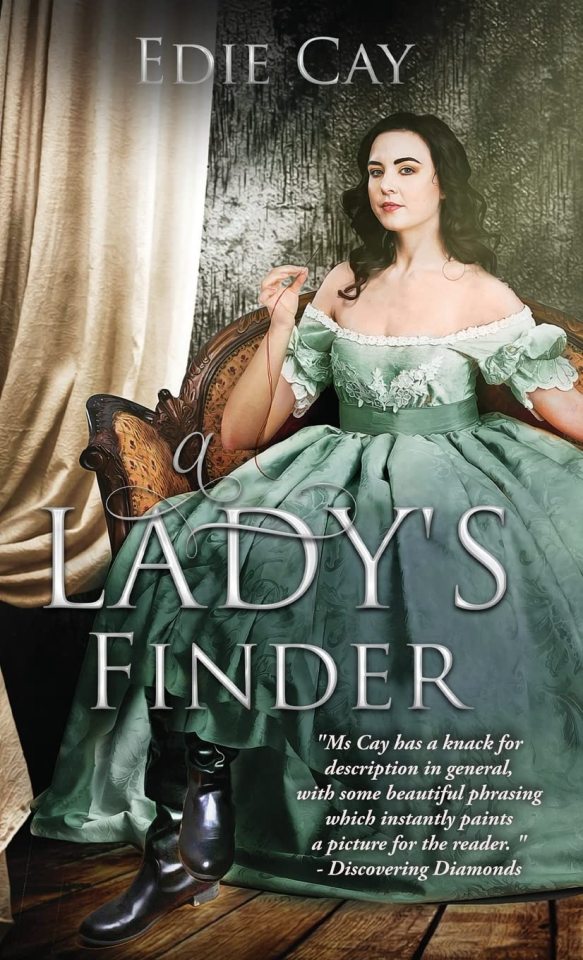
Lady Agnes is a scandal, thanks to her sister’s marriage to a prizefighter.
Or rather, she should be, but as a charitable spinster-to-be, she remains firmly invisible, even to those she loves. Always dutiful, Lady Agnes should be the toast of her family, but only if she marries well. Finding the prospect of wedding a man unpalatable, Lady Agnes cannot be the social savior of her sister.
Suddenly, receiving attentions from the unpredictable and surprisingly resourceful Mr. Jack Townsend, Lady Agnes finds herself believing he might love her and not her dowry. After being overlooked for so long, can she believe he cares for her, or is she a means to an end as her family insists?
Jack About Town is London’s best Finder of Lost Things. What few realize is that Jack transcends the spheres of men and women, existing as both, or perhaps neither, sex. True, his most lucrative finds are pornographic artifacts for rich toffs. But now he has found Lady Agnes, a meticulous, generous, knock-down incredible lady who wears men’s boots. Best of all, Lady Agnes accepts him in his entirety—a jewel so rare that even Jack is surprised he could find it.
When Jack is commissioned to steal from Lady Agnes’s cousin, can Jack find a way to prove his love and still earn the money he needs to protect himself and his home?
9 notes
·
View notes
Text
if my ocs had theme songs pt 1
Tarou - Heaven Knows I'm Miserable Now by The Smiths
everyone would assume that since he's famous and fabulously wealthy he's pretty happy! but due to that fame, Tarou is seen as untouchable and his father's put so much pressure on him to find "the perfect girl" that he's scared to pursue love once he does find it, even though it's the one thing he really wants
Hanako - Nobody Makes Sense by Pinocchio-P
Hanako has a really hard time relating to the people around them due to being raised in London's East End and suddenly being surrounded by rich and important people. they've all but lost sight of why they love life, but then Leo shows up and reminds them how beautiful the world is, even if people rarely make any sense to them
Hajime - Odo by Ado
Hajime regularly participates in prizefighting, and honestly enjoys it, even if he gets hurt quite a bit. his fighting prowess has led to him becoming quite a bit arrogant and just a little rude, however. he recognized it was happening and tried to change it, but he couldn't break it for a very long time
Leo - Kimi Wa Dekinai Ko (You Are A Useless Child) by Kikuo
as a child, Leo had a very hard time communicating his needs with his parents and teachers, leading them to assume that he's incapable and stupid. really, he's very bright and creative, with clothing design coming naturally to him. finally, after seeing just what Leo can do, people are realizing they had him all wrong; they just refused to listen to him.
#oc lore#oc tarou#oc hanako#oc hajime#oc Leo#chiyo and two more characters will be in a separate post!#tbh I'm still really working on chiyo's character#I love my boys so much
2 notes
·
View notes
Note
I want to try historical romance because some of the books you blog about sounded interesting but I don't want anything too old or hard to read. I prefer books with medium spice (my favorite YA is Red White & Royal Blue and I like Elle Kennedy).
Do you have suggestions for me?
Hi! A lot of historicals in my experience fall in that "medium spice" bucket in that there are a handful of quality sex scenes sprinkled throughout the book. Of course, they're a bit more explicit than new adult books like RWRB, but still "medium spice" in my opinion. Full disclose I have not read Elle Kennedy but I've been informed as to what you can expect from her books in terms of sex stuff, so here are my recs accordingly:
Try Sarah MacLean— she's been writing HR for over a decade and her voice feels relatively contemporary while still delivering an immersive historical setting. I'd strongly recommend starting with Nine Rules to Break When Romancing a Rake. It's all about a woman taking back control of her own life rather than succumbing to passivity, and the hero is very smooth and very very hot. And it has great fat rep.
After that, Sarah's Rule of Scoundrels series is definitely worth checking out since it introduces you to the underworld side of the subgenre as it's centered around a gambling hell. My favorites are A Rogue By Any Other Name (childhood friends who fell out, and he forcibly marries her for her land and now doesn't know what to do because Feelings) and One Good Earl Deserves A Lover (nerdy heroine seeks out gambling hell co-owner for sex lessons). If you want to get even more grittier, her Bareknuckle Bastards series is about three siblings who escape their evil father and become prizefighters in London and eventually come to "rule" the underworld. My favorite is Brazen and the Beast, which is about a businesswoman and one of the siblings (named Beast!) whose first meeting involves her finding him tied up in her carriage, them kissing, and her promptly shoving him out said carriage.
Sarah's latest Hell's Belles series has the most contemporary tone because it's about a feminist vigilante girl gang righting gender/class/race/sexuality-based wrongs of the era. My favorites in this series are Heartbreaker (a social chameleon heroine who breaks unwanted society matches and a stern brunch daddy duke who has always *seen* her), and Knockout (sunshine heroine who specializes in explosives, and a grumpy cop hero), which just came out.
Adriana Herrera writes gorgeous historical romances that feel so classic while also proving to naysayers that you can write diverse characters and settings without feeling anachronistic. A Caribbean Heiress in Paris has a Dominican heroine who is in Paris to sell rum from her distillery, and enters into a marriage of convenience with a Scottish whisky distiller.
I'd also rec Adriana's An Island Princess Starts A Scandal— it's a sapphic romance between a silver fox heroine/railway magnate and a Venezuelan heiress who asks her to take her around Parisian lesbian hotspots in exchange for land critical to a railroad.
Since you like Red, White, and Royal Blue, I'd recommend checking out K.J. Charles, who writes m/m historical romances that are humorous and have great banter while still packing suuuuch an emotional punch. The Secret Lives of Country Gentlemen is about a baronet who finds himself being blackmailed by his smuggler ex-hook-up, but end up working together. A Nobleman's Guide to Seducing a Scoundrel is the next book in the series and comes out September 19th— it's a romance between a new earl and the smuggler-secretary he hires, and I'm obsessed (here is my review).
Vivienne Lorret's Mating Habits of Scoundrels series also deliver on the humor and banter along with girl gang shenanigans and great romances. My favorites are My Kind of Earl (a nerdy heroine/bit o'rough hero with a side of beetroot bombs) and How to Steal a Scoundrel's Heart (the heroine is "ruined" and agrees to be the hero's mistress except, well, Feelings).
Also! If you want to try out the genre by starting with novellas, Alexandra Vasti's Halifax Hellions series is free if you subscribe to her newsletter. It has all the hits spread out across three books: best friend's brother who's secretly in love with the heroine, an older, kinky hero who hates himself for wanting to "corrupt" a heroine who absolutely wants it, and a heroine who makes up a husband for Reasons only to find out that he's real... and she must fake-marry him.
#book recs#sarah maclean#adriana herrera#kj charles#vivienne lorret#alexandra vasti#historical romance#romance novels#ask
5 notes
·
View notes
Text
Sunday, 18 August
Pitched above the incessant cry of seagulls, a child chortles with uncontained glee as they watch a RNLI tractor pull a lifeboat in across the Margate harbour. That’s funny, is it? asks the dad. Yes, obvious. It is a tractor in the sea. Such nonsense. But delightful nonsense. I sit on the shallow steps that ring the harbour and extend the Turner Contemporary – that definitive flagship of coastal regeneration – and watch the combination of the high tide and the high season. It’s a windy morning, so it has to be the sheer ease of access that’s lured people in. They don’t swim but continue standing and chatting with their land-based peers. A woman about my age bumps down the stairs, steering a bike with one hand and holding an ice cream in the other without hesitation or misstep. She radiates physical hardihood from her practical t-shirt – shout out to Brixton cycles – to her sure-footed scandals. A hot flare of jealously goes through me. But the prevailing mood is flip-flop frivolity. A mixed group of a half a dozen friends move through, taking up lots of space and making inexorable for the water. One man hops awkwardly ahead to dip his hands into the sea. His performative splash of one woman is well received by the group. This christening performed, they are off. He trips coming back up the stairs and swears. Polish, I decide. A very slim person arrives wearing full coverage pink fuzzy gloves, along with a pink tank and shorts. Gender is a nonsense, obviously, but in deference to the entirely pink outfit I am going with she/he. She carefully peels off the fuzzy gloves, fishes out her mobile, and starts a conversation about how she’s flushed her other mobile down the toilet. She didn’t even notice until she went looking for it. The brain fog has been that bad. Yes, mate. I’m going to take your advice. I’m going to do it, she promises. Static amid these arrivals and departures, a family sits in front of me, replete with pram and bulging beach bags. The four-year-old poses for a selfie with her mother, pointing to her wide grin with an index finger like a prizefighter.
I’ve finished my tea that I brought out in a keep cup. Walking back down King Street, I pass the medley of boutique restaurants and consignment shops. New Zealand flags festoon the Real Fruit Ice Cream corner shop. It’s real fruit ice cream, an older woman walking in front of me observes, that must mean it’s healthier. And that’s why the owner of this chain now lives in a plush pad in Ramsgate. I push open the door to my borrowed home. The front room is peerless Down From London chic complete with eclectic vintage furniture, a prominently displayed record player with the correct vinyl displayed, and, more of a novelty, a fishbowl full of vegan condoms. It’s this sex positive entrepreneurship that made the move possible. Moving to the player, I lower the needle and dial the volume up. For all its hipster affect, Avalon is a damn good record,

0 notes
Link
Bare-Knuckle Matches
Boxing has a long and storied history, rising and falling in popularity through the ages due to a variety of influences. The first recorded fight took place in London in 1681, a bare-knuckle match that is the forerunner of modern boxing. But early boxing did not have the same rules as today’s sport. It was extremely violent, allowing moves that included eye-gouges, head butts, choking and more; some boxers died as a result. It was in this atmosphere that Elizabeth Wilkinson Stokes and other women in the U.K. took up the sport.
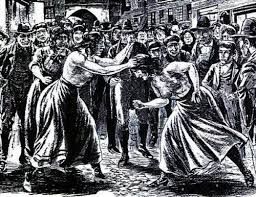
Female Boxers Enter the Ring
Although Stokes probably had fights that went undocumented, the first appearance of her name in print came in 1722, when she beat Hannah Hyfield in a 22-minute match. In the fashion of the day, men and women boxers promoted themselves by boasting about their abilities while challenging other fighters. Stokes called herself the “European Championess” and fought at various venues. While challenges to fight were printed in newspapers throughout England, the bouts themselves were not covered. However, it appears Stokes remained undefeated throughout her career.
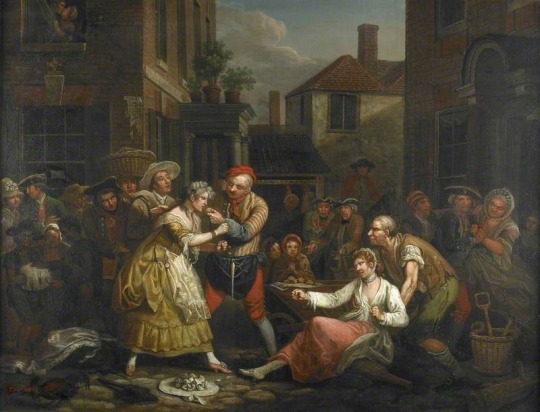
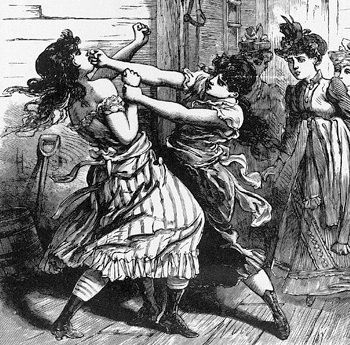
Women Boxers Fight in Pairs Matches
Boxing was a popular event in Great Britain, and although many did not favor the inclusion of women in the sport, others supported and even reveled in it. Elizabeth also fought in pairs matches with her husband, James Stokes. It was common during the early 18th century for female boxers to marry and fight alongside their husbands in couples’ events throughout the British Isles. Some of the contests during Elizabeth Stokes’ career include:
Stokes vs. Hanna Hyfield, 1722, in Hockley, England
Stokes vs. Mary Welch, 1726, at Stokes’ amphitheater in London
Elizabeth and James Stokes vs. Mary Welch of Ireland and future husband, Robert Baker, 1727, in London
Stokes vs. Ann Field, 1728, in Stoke Newington Parish, England
Elizabeth and James Stokes vs. Sarah and Thomas Barret of Ireland, 1728
Elizabeth and James Stokes vs. Mary Waller and Charles Wright, 1729
Weapons were also used in some of these early boxing matches before specific general rules were established. Although most of her bouts were boxing-only events, Stokes was also known for her skills in using a dagger and short sword.
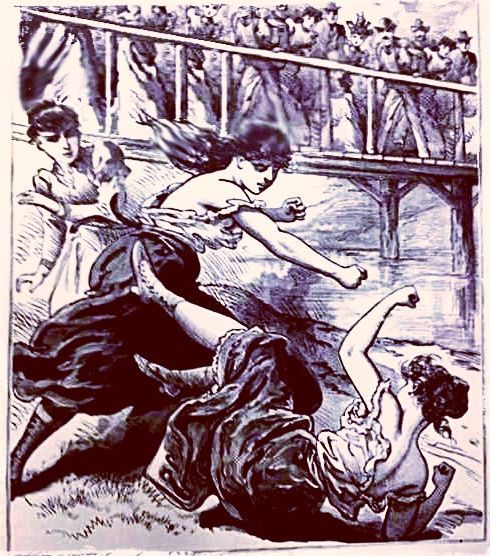
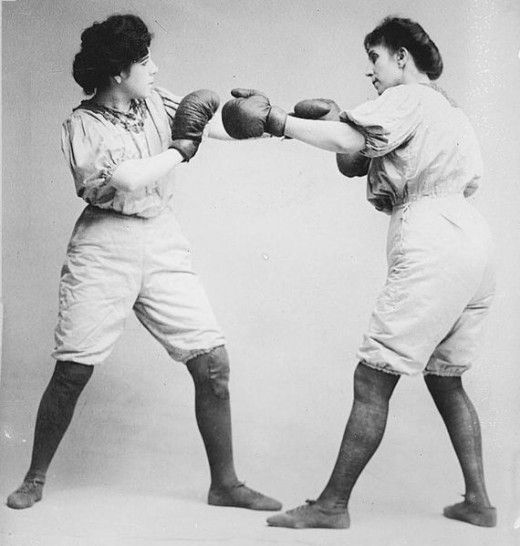
The Entertainment Aspect
Boxing was banned in other European countries until the early 19th century. While it grew in popularity elsewhere during the 1800s, female boxers fell out of favor in England, perhaps due to an evangelical Christianity movement that sent the sport underground. Female martial artists became a form of entertainment and were seen mainly in night clubs and shows. Yet there had always been some sensationalism in promoting women boxers. An advertisement for one of Stokes’ 1726 bouts said the participants would fight in petticoats that fell just below the knee, drawers, stockings and pumps.
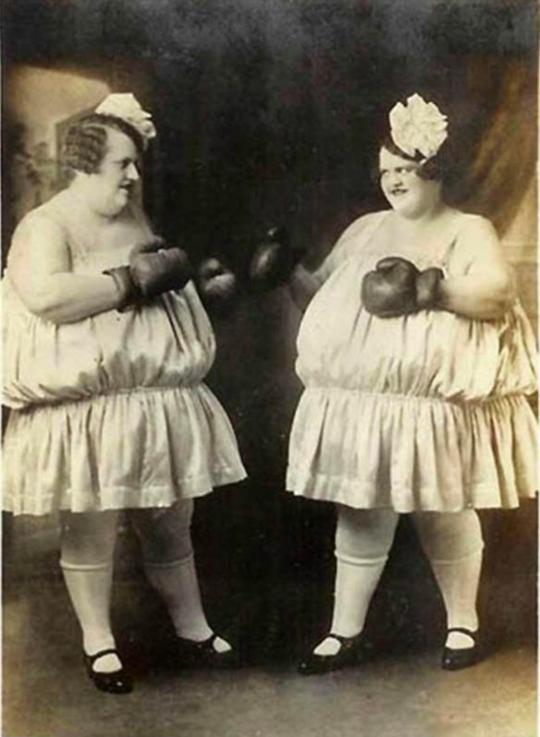
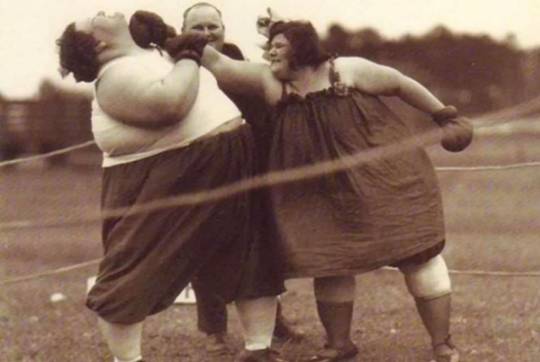
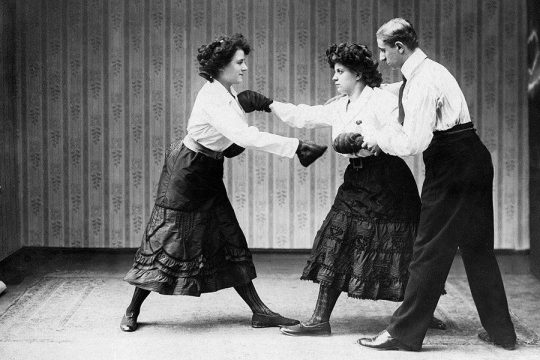
First World Championship Bout
Women’s boxing saw its first world championship bout in New York City in 1888, between Alice Leary and Hattie Leslie. The fight was ferocious, with both combatants receiving black eyes before Leslie won the match. The press belittled the women and the event. They caused such a commotion in the community that both women, plus Leslie’s husband and many others, were arrested and charged with “aiding and abetting a prizefight.” Yet female boxers continued to participate in the sport, and the 1904 Olympics, held in St. Louis, hosted an exhibition match.
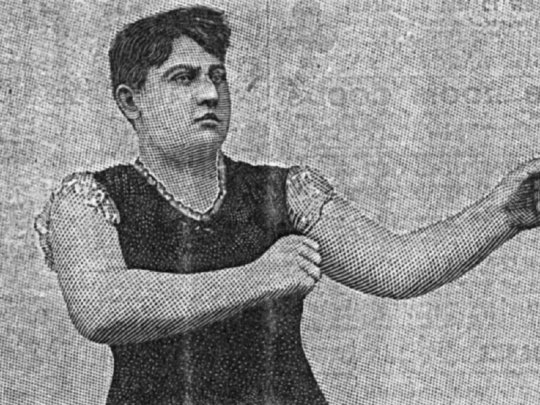
^Hattie Leslie
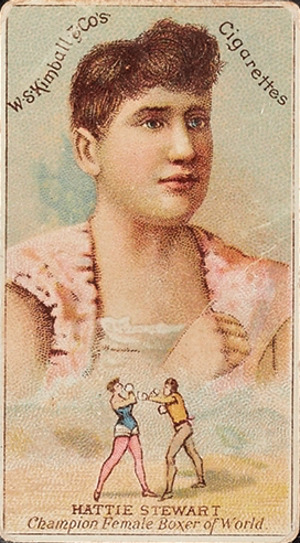
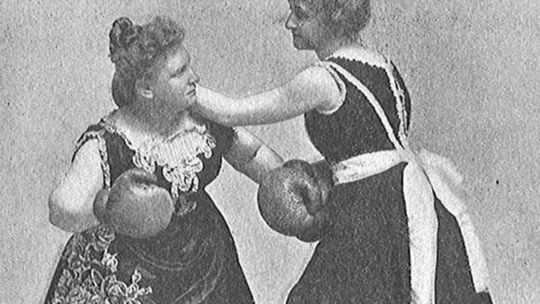
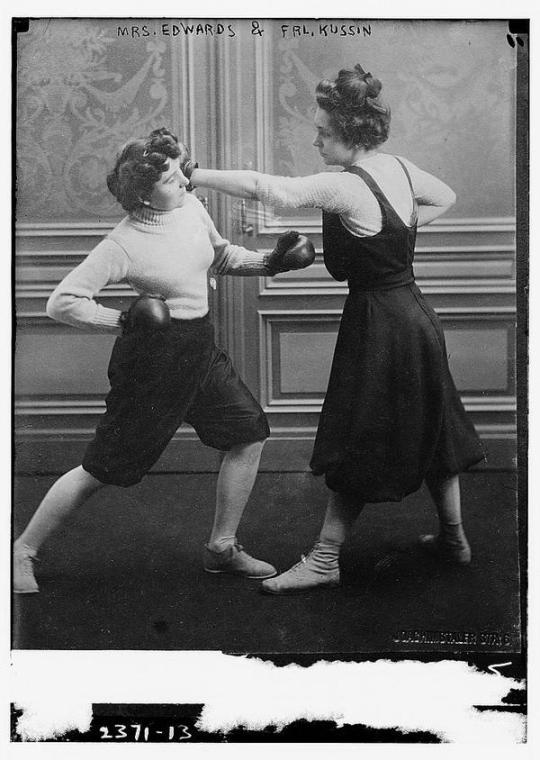
181 notes
·
View notes
Photo
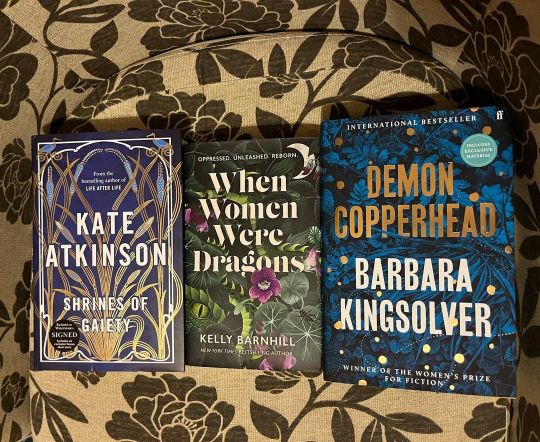
Hello everyone, happy Friday to you all! I’m off work now until Wednesday so that’s the perfect excuse to hopefully get a lot of reading done. Here’s three new beautiful hardbacks I’ve added to my TBR. I’ve only read one Kate Atkinson book before (currently re-reading Life After Life) but am determined to catch up on all her books. This is her latest release and I’m planning to buddy read it with @emmasbookishcorner at some point! Set in the Roaring Twenties in London in a country still recovering from the Great War, London is the focus for a delirious nightlife. In Soho clubs, peers of the realm rub shoulders with starlets, foreign dignitaries with gangsters and girls sell dances for a shilling a time. Nellie Coker is a ruthless ruler, ambitious for her six children. But success breeds enemies. Beneath the gaiety lies a dark underbelly, where one may be all too easily lost. Confession time - the middle book was a total cover/title buy. I #kellvery little about it before I decided I had to have it. Luckily the synopsis was just as good as I had hoped. In an alternate world, We learn about a Mass Dragoning in 1955 where 300,000 women spontaneously transform into dragons…and change the world. Finally, I was eager to get my hands on Demon Copperhead as soon as I heard it was being released. It has been described as a once in a generation novel that breaks and mends your heart in the way only the best fiction can. A boy is born during a traumatic birth to his single mother in a single-wide trailer looking like “a little blue prizefighter.” Raised in poverty and growing up in the middle of the modern opioid crisis, Demon is born on the wrong side of luck, the affection and safety he craves is as remote as the ocean he dreams of seeing one day. The wonder is how far he’s willing to travel in order to get there. I’m also planning on buddy reading this with @emmasbookishcorner I’d love to know your thoughts on any of these books or authors. Let’s have a chat in the comments! #bookstagramuk #scottishbookstagrammer #morebookslessproblems #shrinesofgaiety #kateatkinson #whenwomenweredragons #kellybarnhill #demoncopperhead #barbarakingsolver #booksicantwaittoread https://www.instagram.com/p/CmhLQgwrk1Y/?igshid=NGJjMDIxMWI=
#kellvery#bookstagramuk#scottishbookstagrammer#morebookslessproblems#shrinesofgaiety#kateatkinson#whenwomenweredragons#kellybarnhill#demoncopperhead#barbarakingsolver#booksicantwaittoread
2 notes
·
View notes
Text
Jack Dempsey, then the former heavyweight champion and retired, works out with "The Golden Greek" Jim Londos, well-known professional wrestler.
#anythingtowin #pugilism #bkb #pugilist #bareknuckle #boxing #ultimatefightingmanual #ufm #boxer #boxingtraining #martialarts #bareknucklefc #bareknuckle #bareknuckleboxing #ukbkb #kindle #selfdefence #fight #fighting #streetfighter #fighting #ufc #mma #combatsports #bkfc #trainingmanual #bareknucklefighting #devlin #bigal #bigaldevlin
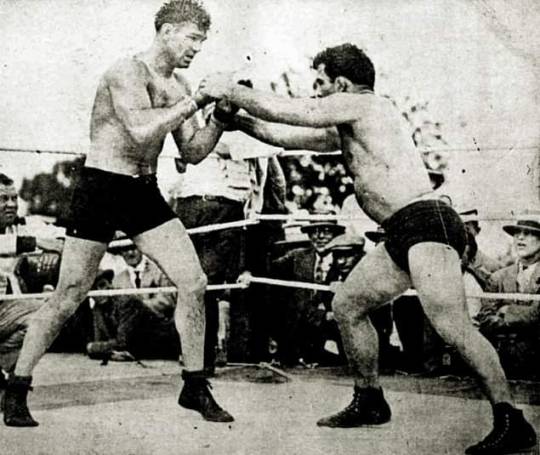
#alastair devlin#anything to win#atw#bare knuckle#bare knuckle boxing#big al devlin#bkb#book#boxing#devlin#pugilism#pugilst#l#london prizefighting#prize fighting#prize fighter#dempsey#jack dempsey
4 notes
·
View notes
Link
I got a bit distracted between the safe haven baby fics and updating the Woke Up Married fic and writer’s block + life has been crazy but! Have an update!
Chapters: 5/? Rating: E for eventually Relationships: Evan "Buck" Buckley/Eddie Diaz (9-1-1 TV) Additional Tags: Alternate Universe - Historical, Alternate Universe - Victorian, Eventual Smut, Romance, I Don't Know Where All This Plot Came From But Here We Are, Canon-Typical Violence
Summary:
Evan Buckley, Marquess of Holbrook, hasn’t moved regularly in polite society for years—not since his sister, the Duchess of Kendall, disappeared only three years after her marriage to the duke. Instead, he vanished as well, into the dark underbelly of London, ultimately re-emerging as one of four owners of London’s most exclusive gambling hell, where secrets are currency as much as money itself. But within the walls of 118 Bow Street, the question remains—is the young lord looking for redemption? Or revenge…?
Eddie Diaz, displaced American and Covent Garden prizefighter, has a reputation for being unbeatable—or at least, he did before he started losing. But not all is as it seems, and the Hellfire Club happens to be in need of a man in a ring…
When worlds collide and secrets are revealed, will the lives of both men change for the better? Or will everything they hold dear go up in flames?
48 notes
·
View notes
Text
Legendary Pugilist John L. Sullivan Won A Championship In A Cincinnati Bout
Off the top of your head, without consulting your phone, can you name any of today’s heavyweight boxing champions?
In 1890, everyone knew the name and fame of John L. Sullivan. He was a frequent visitor to Cincinnati and was easily the most famous celebrity of that era. “Jawn L.” was so famous, the people who shook his hand became celebrities themselves. "Let me shake the hand of the man who shook the hand of John L. Sullivan" became a Victorian catchphrase.
Sullivan is remembered as the first and the last. He was the first heavyweight champion of gloved boxing and is also recognized as the last heavyweight champion of bare-knuckle boxing. Sullivan was enormously successful, the first American athlete to earn more than $1 million in his lifetime. Depending on which boxing historian you consult, Sullivan may have earned the first heavyweight crown awarded under the Marquess of Queensberry Rules by winning a fight right here in Cincinnati.
That fight actually occurred just outside Cincinnati. Boxing, although enormously popular throughout the 1800s, was mostly illegal. When word got around that Sullivan was booked to take on Dominick McCaffrey at Chester Park out on Spring Grove Avenue, he was arrested on a warrant sworn by Cincinnati’s Law and Order League under an Ohio law prohibiting prizefighting. McCaffrey went into hiding at a roadhouse near the Zoological Gardens to escape a similar detention.
Sullivan was hauled into the courtroom of Judge Alex B. Huston and testified that he was indeed scheduled to fight McCaffrey, but only in a sparring demonstration. The dubious judge was eventually convinced on learning this “sparring” match would have both pugilists wearing gloves. Since almost all boxing up to then had been conducted under the bare-knuckles London Prize Ring Rules, Judge Huston agreed that the gloved bout did not constitute a real prizefight and could proceed.
Nearly 15,000 spectators packed the grounds and grandstand at Chester Park on 29 August 1885. Although it was later developed as an amusement resort, Chester Park at that time was basically a large horse-racing track. (“Chester” was the proprietor’s favorite horse.)
Sullivan and McCaffrey slogged through seven mostly indecisive rounds until the referee called the contest in Sullivan’s favor. Although many, including the Enquirer, objected to that decision, it was eventually agreed that Sullivan had fairly won on points, if not style. After pocketing $1,000 and a commemorative ring, McCaffrey conceded that Sullivan was the legitimate world champion – the first title achieved while wearing gloves.

Just four years later, Sullivan won the last title fight conducted without gloves, against Jake Kilrain in 1889. He finally lost his championship titles to “Gentleman” Jim Corbett in 1892. Throughout his career, Sullivan augmented his boxing earnings on the vaudeville circuit. Sullivan’s on-stage performances attracted quite a few feminine fans, including the “Jersey Lily,” Mrs. Lillie Langtry. As Al Thayer of the Cincinnati Enquirer related the incident in his 1894 book, “Ah There! Pickings from Lobby Chatter,” Mrs. Langtry and drama critic Mary H. Fiske, who wrote under the pen name “Giddy Gusher,” wangled their way into a private meeting with the champ through black-face comedian Lew Dockstader:
“Lew Dockstader told me a good story on John L. Sullivan, the other day, that has never been published. While the champion was in training for one of his matches, Mrs. Fiske, “The Giddy Gusher,” now deceased, told Lew she would like to go to his training quarters and take Mrs. Langtry with her, the latter being very desirous of seeing Sullivan. Lew and John were old friends and the latter said he would be glad to meet the ladies. On their arrival at the Sullivan quarters they were introduced, and, after shaking hands, the champion said: “Ladies, would you like to see me strip?” Of course he meant to show them his muscle, but the “Jersey Lily” was “not on” and she blushed to the roots of her hair. “The Gusher” winked at Lew and said: “We should be proud to.” And Sully stripped.”
For most of his career, Sullivan was a notorious drinker, and it was another stage performance that brought Sullivan and his appetite for demon rum to Cincinnati in 1891. The Cincinnati Enquirer (23 Apr 1891) tells the tale:
"John L. Sullivan made a spectacle of himself during the performance given by his company at the People's Theater last night that was not edifying. Among other things, he said he was drunk, and glad of it."
According to the newspaper, Sullivan was registered at the Gibson House but spent most of his time at Belle Curry's bordello on Broadway. Madam Curry might well have wished the big lug had confined himself to the Gibson, because Sullivan made a mess of her "resort." He kicked over a tray of glasses, beat up an employee named Fannie Frazier, demolished chairs and other furnishings.
Word of the champ's exploits reached Cincinnati Police Chief Philip Dietsch, who decided to take matters into his own hands. The Chief marched down to the People's Theater and confronted Sullivan.
"Sullivan," Chief Dietsch said, "you are a fine specimen of manhood. I wish I was as big and I would tackle you myself."
"You are a good sized little man yourself," said Sullivan, "but you will have to excuse me; I have been drinking."
The Chief agreed that Sullivan had been imbibing, a good deal.
"Well, I am not the worst fellow in the world," Sullivan said, "and I am not as bad as people say I am."
Chief Dietsch called it a draw and Sullivan continued to enjoy the freedom of the city. The Enquirer opined that Sullivan should appreciate the courtesy he was shown, but one imagines that Chief Dietsch was relieved not to engage in fisticuffs with the former heavyweight champion of the world.

5 notes
·
View notes
Photo
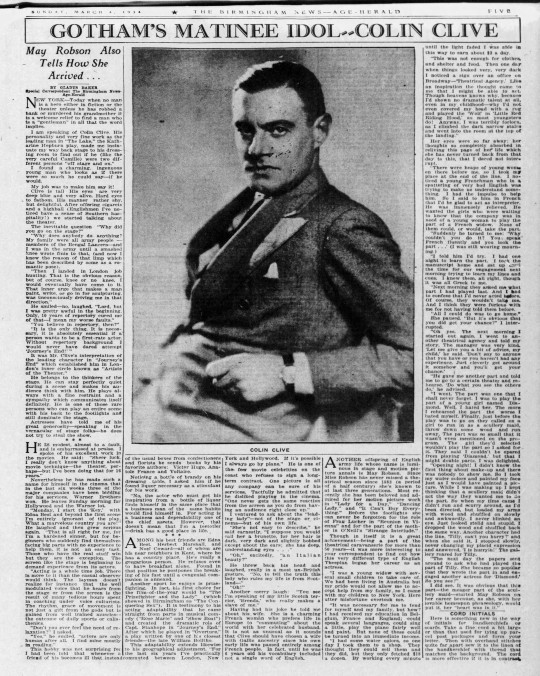
I haven't seen anyone post this interview with Colin Clive before, and it's quite a good one. So anyway, here's an article from the Birmingham News-Age-Herald on March 4, 1934, written by Gladys Baker. The text might be kind of hard to read, so here's a transcript. (I didn't transcribe the other article about May Robson, so apologies to all you May Robson fanatics out there; let me know and I will do it):
“Gotham’s Matinee Idol: Colin Clive” By Gladys Baker, Special Correspondent to The Birmingham News-Age-Herald
New York--Today when no man is a hero either in fiction or the theater unless he has robbed a bank or murdered his grandmother it is a welcome relief to find a man who is a “gentleman” in all that the word implies.
I am speaking of Colin Clive. His personality and very fine work as the leading man in “The Lake,” the Katharine Hepburn play, made me insinuate my way back stage to his dressing room to find out if he (like the very careful Camille) were two different persons “off stage and on.”
I found a charming, ingenuous young man who looks as if there were so much more he could say--if he would.
My job was to make him say it!
Clive is tall. His eyes are very deep blue and very alive. Hard eyes to fathom. His manner rather shy, but delightful. After offering cigarets and a highball (Englishmen I’ve noticed have a sense of Southern hospitality!) we started talking about the theater.
The inevitable question: “Why did you go on the stage?”
“Why does anybody do anything? My family were all army people--members of the Bengal Lancers--and I was in the army until a smashed knee wrote finis to that.” (and now I knew the reason of that limp which has been described by some as a romantic pose).
“Then I landed in London job hunting. That is the obvious reason, but of course, knee or no knee, I would eventually have come to it. That inner urge that makes a man paint, write, or go in for sculpturing, was unconsciously driving me in that direction.”
He smiled--no, laughed. “Lord, but I was pretty awful in the beginning. Only, 10 years of repertory cured me of that--I mean my worse faults.”
“You believe in repertory, then?”
“It is the only thing. It is necessary, it is absolutely essential if a person wants to become a first-rate actor. Without repertory background I would never have dared attempt ‘Journey’s End’!”
It was Mr. Clive’s interpretation of the leading character in “Journey’s End” which established him in London’s inner circle known as “Artists of the Theater.”
He belongs to the thinkers of the stage. He can stay perfectly quiet during a scene and makes his audience think with him. He plays always with a fine restraint and a sympathy which communicates itself definitely. He is one of those rare persons who can play an entire scene with his back to the footlights and still dominate the stage.
Actresses have told me of his great generosity--speaking in the vernacular of stage folks--he does not try to steal the show.
*****
He is modest, almost to a fault, and is embarrassed at praise. I spoke of his excellent work in the movies. He said: “Sheer luck. I really don’t know anything about movie technique--the theater, perhaps--but I’ve been doing that for 16 years.”
Nevertheless he has made such a name for himself in the cinema that in the last six weeks three of the major companies have been bidding for his services. Warner Brothers won. He leaves Sunday morning for Hollywood and the Warner lot.
“Monday, I start the ‘Key,’ with Edna Best and beyond the first scene I’m entirely ignorant of the play. What a marvelous country you are!” He laughed and then grew serious again. “That is all right for me, for I’m a hardened sinner, but for beginners who suddenly find themselves facing big parts with no experience to help them, it is not an easy task. Those who have the real stuff win but they are the exception. The screen like the stage is beginning to demand experience from its actors.”
“Acting is a whole time job. There is more to it than the casual observer would think. The layman doesn’t realize for instance that the well modulated voice that he hears from the stage or the screen is the result of many tedious hours spent in coaching under voice culturists. The rhythm, grace of movement is not just a gift from the gods but is gained from well trained muscles--the outcome of daily sports or calisthenics.”
“Don’t you ever feel the need of relaxation?” I asked.
“Yes,” he smiled, “actors are only human after all. I find mine mostly in reading.”
This hobby was not surprising for I had been told that whenever a friend of his becomes ill that instead of the usual boxes from confectioners and florists he sends books by his favorite authors: Victor Hugo, Anatole France and Voltaire.
Noting a bottle of brandy on his dressing table, I asked him if he found liquor necessary as a stimulant for his work.
“No, the actor who must get his inspiration from a bottle of liquor finds himself in the same place that a business man of the same habits would find himself in. For acting is a business and dependability one of the chief assets. However, that doesn’ t mean that I’m a teetotler--drink has a good place in life.”
***
Among his best friends are Edna Best, Herbert Marshall, and Noel Coward--all of whom are his near neighbors in Kent, where he has a country place. He’s really a gregarious person. He refuses even to have breakfast alone. Found in that position he postpones the breaking of his fast until a congenial companion is annexed.
Another sport he enjoys is prizefighting. In fact, his first choice for the film-of-the-year would be “The Prizefighter and the Lady” (which showed in Birmingham as “The Conquering Sex”). It is testimony to his acting adaptability that he came straight from parts in musical comedy (“Rose Marie” and “Show Boat”) and created the dramatic role of Capt. Stanhope in “Journey’s End.” After which he played in “Overture,” a play written by one of his closest friends--the late William Bolitho.
This adaptability extends likewise to his geographical adjustment. “For the last six years I’ve practically commuted between London, New York and Hollywood. If it’s possible, I always go by plane.” He is one of the few movie celebrities on the coast who refuses to sign a long-term contract. One picture is all any company can be sure of his services. Tactfully he admitted that he disliked playing in the cinema. “One never gets the same reaction from the screen as you do from having an audience right close up.”
I ventured to ask about the “leading lady”--not of the stage or cinema--but of his own life.
“She’s not easy to describe,” he said earnestly. “I suppose you would call her a brunette, for her hair is dark, very dark and slightly bobbed except about the ears; she has deep, understanding eyes…”
“Oh” excitedly, “an Italian beauty?”
He threw back his head and laughed, really in a most un-British gesture. “No, to tell the truth this lady who rules my life is from Scotland--”
“Oh!”
Another merry laugh: “You see I’m speaking of my little Scotch terrier, ‘Brenda,’ who really makes a slave of me.”
Having had his joke he told me about his wife. She is a charming French woman who prefers life in Europe to “commuting” about the world with her celebrated husband. It is not as unusual as it sounds that Clive should have chosen a wife with Gallic ancestry since his own early life was passed entirely among French people. In fact, until he was 6 years old his vocabulary included not a single word of English.
#Colin Clive#being terribly charming and modest#and slightly odd#interview#1934#the lake#Brenda returns!
14 notes
·
View notes
Text
‘Headcanons’ - Other Recurring Canon Characters
Dr. John Heimdall Watson
human
somewhere in his 30′s
typically considered average in appearance, though some think his moustache unattractive
soul-blade: Ossifer (shard of bone, barely larger than a toothpick)
was sent to the Battle of Maiwand in Afghanistan, where he ended up shot through the left shoulder; contracted ‘enteric fever’ from the filthy conditions of the hospital at Peshawar, lost a dangerous amount of weight; once he recovered he was discharged from the army
ended up back in London, nearly penniless and in desperate need of employment, proper nourishment, and a permanent place to live; his old school acquaintance Stamford introduced him to Warlock Holmes (or more like, pushed Watson onto Warlock so he could move out of 221B and be ‘freed’ from Warlock’s unusual company)
Watson agreed to move in, especially upon learning he would only have to pay one sovereign, once, for the entirety of his rent - as well as move in at exactly midnight and walk in backwards over the threshold
was given the far larger of the two bedrooms, while Warlock occupied the almost closet-sized other
he noticed several strange things occurring around Warlock but ignored them, until the latter received a ‘message’ from Moriarty’s entrapped soul and a letter from Inspector Grogsson both talking about a murder case; Watson tagged along and ended up being an immense help; since then, he’s gotten more and more involved in cases and dealing with the supernatural/magical world
Mrs. Hudson
human
in her 70′s
barely 4 feet tall, wears battered pink house slippers; was “a tough old spinster, as advanced in age as she was regressed in height and interpersonal skills”, with “the eyes of a weasel, the heart of a shrew, and a scowl to rival any of the grand inquisitors who had so troubled Spain in the 1400s”
would sometimes appear unannounced outside the door to their rooms, staring with supreme disapproval at whoever first opened it
was a very avid collector of French smut novels, which she attempted to conceal around the house
Warlock and Watson agreed to only rely on her for the washing of dirty dishes - though even these would sometimes be returned in pieces, as if broken out of spite
Inspector Vladislav Lestrade
vampire
true age unknown; appears to be in his mid-50′s
small, pale, and hunched, with beady eyes, a Romanian accent, and a wide maw of overlapping fangs (usually speaks in a tight-lipped fashion to hide his teeth)
often has a complaint for every occasion
holds ‘annihilist’ views - believes there should be nothing, would happily destroy all of creation (even himself) if given the power - yet still quietly values being considered a friend
an Inspector of the London police force, has risen to the position through his knowledge of blood and assistance from Warlock and Grogsson - though his success is resented among his Scotland Yard peers
Inspector Torg Grogsson
ogre
age unknown
stands at least 7, even 8 feet tall; difficult for suits to fit his thickly-muscled body; has coarse brown body hair and sandpapery stubble on his chin
often has his fists wrapped in cloth like a prizefighter’s, also wears a battered bowler hat (dented from repeatedly hitting his head against doorframes he walks through)
has an intense admiration for gentle and graceful people
speaks basic English
has a tasteful eye for interior decoration
often easily falls for women, especially if they’re pretty and kind-hearted
an Inspector of the London police force, rose to his position through his skill at intimidating criminals into confessing and assistance from Warlock and Lestrade - though his success is also resented among his Scotland Yard peers
Irene Adler
human
likely in her late 20′s/early 30′s
rather attractive; has piercing green eyes and quite short brown hair (to make it easier to wear wigs in her disguises)
‘adventuress’ and a vaunted contralto
grew up poor and orphaned, taken in by Moriarty in her youth, but has now gone her own way and has her own aims
current possessor of both the Heart and the Cruciator, after murdering Godfrey Norton
has become a sort of nemesis to Watson, as she sometimes foils his plans or is involved in cases
seeks “the answer to the human question ... How can we make ourselves happy? Fulfilled? How can we win this strange game we find ourselves thrust into?”
Professor James Moriarty
sorcerer
age unknown
used to appear as an austere, black-clad man with small dark eyes; current appearance changes, as his soul/concept possesses various people
soul-blade: Kullek (blade roughly the size of a butter knife)
mastermind of various criminal enterprises, often gives his agents magical artifacts to further facilitate such deeds
seeks a form of immortality - wants to exist at every point in history, in every dimension; can’t bear not to know a thing and doesn’t want to miss out on any of it, including dying in various ways; simply put, he wants omniscience
was Warlock’s ‘master’ back in the mid-1600s for a while; abandoned him after the fifth ley line was opened beneath Baskerville Hall in 1643; took him on to not only teach some control but to learn how to turn base metals into gold, abused and maltreated Warlock when the boy was repeatedly unable to properly explain the process
had his physical body killed by Warlock’s soul-blade some time later, cast down into a deep well; his soul/self-concept survived, though, and for a long time was entrapped within the threads of Warlock’s own soul
when the soulbinder Milverton died (murdered by Irene Adler), enough threads vanished for Moriarty’s ‘soul’ to escape and continue his nefarious work - largely by possessing various people/creatures
Mary Morstan
human
entirely average in appearance - height, build, face, with plain hair and drably colored/cut clothes
believes she is owed whatever she wants due to being an orphan, continues trying to use that fact to her advantage despite being a grown adult
worked as a governess for the Forresters until being soul-bound and unhappily married to Watson (due to Warlock’s interference, as he wanted to lessen Watson’s involvement with Moriarty and Irene Adler in particular, since Warlock could sense the doom encroaching upon his friend ever since meeting Adler)
thanks to her portion of the Agra treasure and marriage to a now-established doctor, she enjoyed a comfortably lavish lifestyle and took full advantage of that
was possessed by Moriarty at one point, who used her frequent social gatherings as a cover to coordinate with his agents; ended up being pulled into a deep chasm in a ‘magicless’ area of Switzerland
2 notes
·
View notes
Text
Canada Lee
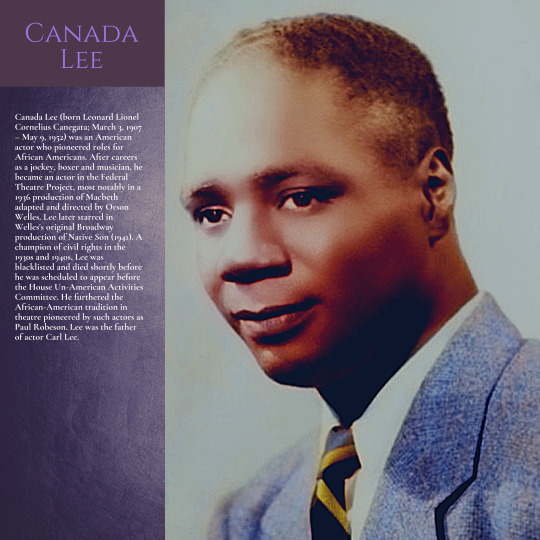
Canada Lee (born Leonard Lionel Cornelius Canegata; March 3, 1907 – May 9, 1952) was an American actor who pioneered roles for African Americans. After careers as a jockey, boxer and musician, he became an actor in the Federal Theatre Project, most notably in a 1936 production of Macbeth adapted and directed by Orson Welles. Lee later starred in Welles's original Broadway production of Native Son (1941). A champion of civil rights in the 1930s and 1940s, Lee was blacklisted and died shortly before he was scheduled to appear before the House Un-American Activities Committee. He furthered the African-American tradition in theatre pioneered by such actors as Paul Robeson. Lee was the father of actor Carl Lee.
Biography
Canada Lee was born Leonard Lionel Cornelius Canegata on March 3, 1907, in the San Juan Hill neighborhood of Manhattan in New York City. His father, James Cornelius Lionel Canegata, was born on the Caribbean island of St. Croix, and as a youth had migrated to New York, where he married Lydia Whaley Gadsen. Raised by his parents in Harlem, Lee had an aptitude for music, and at age seven he began studying violin and piano with J. Rosamond Johnson at the Music School Settlement for Colored People. He made his concert debut at age 11, performing a student recital at Aeolian Hall. But after seven years of music studies, without explanation, he put away his violin and ran away from home. In 1921, aged 14, Lee went to Saratoga Springs, New York, and began a two-year career as a jockey.
Lee returned to his parents' home in Harlem in 1923 with no idea what he was going to do next. He considered returning to music, but an old school friend suggested that he try boxing. At one amateur match, fight announcer Joe Humphries saw the name "Canagata, Lee" on the card he was using. He tossed the card aside and instead announced "Canada Lee"—a name that Lee liked and adopted. In the amateur ring he won 90 out of 100 bouts and the national amateur lightweight title.
Lee turned pro at age 19, in October 1926, and became a favorite with audiences. At 5 feet 9 inches (1.75 m) and about 144 pounds (65 kg), he fought as a welterweight. His boxing statistics vary due to incomplete coverage and record keeping for the sport in the 1920s and 1930s. Boxing historian Donald R. Koss documents Lee having 60 bouts 1927–31, the majority of them taking place 1927–28. The New York Times reported that Lee had some 200 professional matches and lost only about 25.
During his victorious 10-round bout with Andy Divodi at Madison Square Garden on December 12, 1929, Lee was dealt a blow over his right ear that detached his retina. With treatment his vision could have been saved, but Lee feared losing his successful career and masked his injury. In time he lost all sight in his right eye. He quit professional boxing in 1933. Despite having made an estimated $90,000 during his boxing career (roughly equivalent to $1.7 million today), Lee was broke. "Just threw it away," Lee later said. Lee eventually lobbied for insurance, health care, financial consultation and retirement homes for fighters. "The average boxer possesses little education," he said in 1946. "If he winds up broke, he has no trade, no education and nobody to turn to."
As Lee's fighting career began to wind down, he put together a small dance band that played at obscure clubs. When an old friend, sportswriter Ed Sullivan, plugged him in his new entertainment column, Lee and his group began landing better engagements. His career as a bandleader peaked in 1933 when his group played at the Lafayette Theatre in Harlem. The following year he opened his own small club, The Jitterbug, which he managed to operate for six months. When it closed he had no prospects, and his mother convinced him to simply get a job.
Acting
All my life I've been on the verge of something. I'm almost becoming a concert violinist and I run away to the races. I'm almost a good jockey and I go overweight. I'm almost a champion prizefighter and my eyes go bad. Now I've got it, now I've got what I'm going to be.
Lee discovered a love for Broadway theatre during his years as a prizefighter. He remembered Show Boat as the first stage production he ever saw: "A big, tough fighter, all muscle, just sobbing," he recalled.
His acting career began by accident in 1934. While at a YMCA to apply for a job as a laborer, Lee stumbled upon an audition in progress and was recognized by playwright Augustus Smith. Lee was invited to try out, and won a supporting role in Brother Mose, directed by Frank H. Wilson. Sponsored by New York's Civil Works Administration, the show toured the boroughs, playing at community centers and city parks into the fall of the year. In October 1934 Lee succeeded Rex Ingram in the Theatre Union's revival of Stevedore, which toured to Chicago, Detroit and other U.S. cities after its run on Broadway. It was his first professional role.
Lee then was cast in his first major role, that of Banquo, in the legendary Federal Theatre Project production of Macbeth (1936), adapted and directed by Orson Welles.
"I never would have amounted to anything in the theatre if it hadn't been for Orson Welles," Lee recalled. "The way I looked at acting, it was interesting and it was certainly better than going hungry. But I didn't have a serious approach to it until … I bumped into Orson Welles. He was putting on a Federal Theatre production of Macbeth with Negro players and, somehow, I won the part of Banquo. He rehearsed us for six solid months, but when the play finally went on before an audience, it was right—and it was a wonderful sensation, knowing it was right. Suddenly, the theatre became important to me. I had a respect for it, for what it could say. I had the ambition—I caught it from Orson Welles—to work like mad and be a convincing actor."
Macbeth was sold out for ten weeks at the Lafayette Theatre. After an additional two weeks on Broadway it toured the nation, including performances at the Texas Centennial Exposition in Dallas.
After five months in a supporting role, Lee succeeded Rex Ingram as the lead in the stage production Haiti (1938), portraying Haitian slave turned emperor Henri Christophe. One of the Federal Theatre Project's most popular productions, Haiti was seen by some 90,000 people at the Lafayette Theatre in Harlem and at Boston's Copley Theatre.
In January 1939, with the end of the Federal Theatre Project, Lee won a role in Mamba's Daughters, a Broadway success that toured North America and returned to Broadway for another brief run in 1940. Lee took a break from the road tour to make his motion picture debut in Keep Punching (1939), a film about boxing. He made his radio debut as narrator of the weekly CBS jazz series Flow Gently, Sweet Rhythm (1940–41). As that regular series came to an end, he opened a restaurant at 102 West 136th Street, Canada Lee's Chicken Coop, which offered authentic South Carolina cuisine, jazz and blues. Lee kept it going despite chronic financial difficulties.
Lee played the lead role in the 1940 revival of Theodore Ward's Big White Fog. A 1938 Federal Theatre Project production, the play was remounted by the newly created Negro Playwrights Company, founded in New York by Ward, Langston Hughes, Paul Robeson, Theodore Browne, Richard Wright and Alain Locke.
Lee became a star overnight in his ultimate stage success, Native Son (1941), an adaptation of Richard Wright's novel staged on Broadway by Orson Welles. The show was a spectacular hit for both Welles and Lee, who starred in the initial New York run, a 19-month national tour, and a second run on Broadway with accessible ticket prices. "Mr. Lee's performance is superb," wrote Brooks Atkinson of The New York Times, who called him "certainly the best Negro actor of his time, as well as one of the best actors in this country." Wright also applauded the performance, noting the contrast between Lee's affable personality and his intensity as Bigger Thomas. The sympathetic portrayal of a black man driven to murder by racial hatred brought much criticism however, especially from the Catholic Diocese of Brooklyn and the Legion of Decency, and the ensuing pressure forced the play to close.
During World War II, Lee continued to act in plays and in films. In 1942, he played in two comedies by William Saroyan, and earned approving reviews despite the generally negative response to these plays. In 1943, his name was above the title on the marquee for South Pacific, a race-themed drama directed by Lee Strasberg that again was panned by critics but won Lee critical praise.
Perhaps Lee's most famous film role was in Alfred Hitchcock's Lifeboat (1944), in which he played ship’s steward Joe Spencer, one of 8 men and women who survive the sinking of the freighter carrying them from New York to London and are joined in their lifeboat by a survivor of the crew of the U-boat that destroyed their vessel.
According to a June 22, 1943, Hollywood Reporter news item, Lee was the first actor cast for the film. The script was criticized for making Joe "too stereotypical". Lee testified that he attempted to round out the character by revising dialogue, primarily eliminating repeated "yessir"s and "nossir"s that sounded subservient, and cutting some actions. An NAACP critique of the film condemned the role of Joe and praised Lee’s performance. The Baltimore Afro-American's review, while commenting on the character's shortcomings, praised Lee's portrayal. Historian Rebecca Sklaroff, while writing in 2009 that Joe's role was more "tokenistic" than black roles in the wartime films Sahara and Bataan, noted that Joe was depicted as compassionate, dependable and heroic. He is the only one who resists the impulse of mob fury that leads the other characters to kill the German. He is the only character who steps forward to disarm the wounded German sailor rescued at the end of the film.
Lee's successful radio career continued with New World A-Comin', which made its debut in March 1944. He narrated the first two seasons of the groundbreaking WMCA radio series that presented Negro history and culture to mainstream American audiences.
He became the first African American to play Caliban, in Margaret Webster’s 1945 Broadway rendition of The Tempest. Lee had admired Shakespeare since his turn in Macbeth; indeed, at the time of his death he was preparing to play Othello on film.
In 1946, Lee played a principal role in On Whitman Avenue, a drama about racial prejudice directed by Margo Jones. Lee produced the play, making him the first African-American producer on Broadway. The play spoke directly to the need for interracial housing following World War II and won the praise of former First Lady Eleanor Roosevelt, who wrote weekly columns encouraging readers to see it.
In the autumn of 1946, Lee made American theatre history when he portrayed the villain Daniel de Bosola in John Webster's The Duchess of Malfi. Presented in Boston and on Broadway, the production marked the first time a black actor had played a white role on the stage. Lee wore a special white paste that had been used medically, to cover burns and marks, but had never before been used in the theatre.
In 1947, he had a supporting role in Robert Rossen's Body and Soul, another boxing picture.
In 1948, Lee played his last stage role, that of a devoted slave in Set My People Free, Dorothy Heyward's drama based on the aborted 1822 slave revolt led by Denmark Vesey.
In 1949, he took a supporting role in Lost Boundaries, a drama based on William Lindsay White's book of the same title, a nonfiction account of Dr. Albert C. Johnston and his family, who passed for white while living in New England in the 1930s and 1940s.
Lee's last film appearance was the starring role of minister Stephen Kumalo in Cry, the Beloved Country (1951).
Civil rights activism
As an actor, Lee came into contact with many of the leading progressive figures in the country. Langston Hughes, for instance, wrote two brief plays for Lee; these were submitted to the Theater Project, but their criticism of racism in America was deemed too controversial, and neither was staged. Lee spoke to schools, sponsored various humanitarian events, and began speaking directly against the existing segregation in America's armed forces, while simultaneously acknowledging the need to win World War II. To this latter end, he appeared at numerous USO events; he won an award from the United States Recruiting Office and another from the Treasury Department for his help in selling war bonds. These sentiments would carry on throughout his life, culminating in his early firsthand account of apartheid in South Africa.
Lee was an early influence on physician and human rights activist H. Jack Geiger. They met in 1940 when Geiger, a 14-year-old middle-class Jewish runaway, was backstage at a Broadway production of Native Son. Lee agreed to take Geiger in when he showed up at his door in Harlem asking for a place to stay. With the consent of his parents, Geiger stayed with Lee for over a year. Lee took on the role of surrogate father and introduced Geiger to Langston Hughes, Billy Strayhorn, Richard Wright, and Adam Clayton Powell. Geiger eventually became a journalist, then a doctor who co-founded the first community health center in the United States, Columbia Point Health Center in Dorchester, Massachusetts. He became a founder of Physicians for Social Responsibility and Physicians for Human Rights, and established community health centers in Mississippi and South Africa. Geiger says he would never have moved so deeply in these worlds so quickly if not for his experiences with Canada Lee.
By the late 1940s, the rising tide of anti-communism had made many of Lee’s earlier contacts politically dangerous. In 1949, the trade journal Variety stated that under no circumstance was Lee to be used in American Tobacco’s televised production of a radio play he had recently starred in because he was "too controversial".
The same year, the FBI offered to clear Lee’s name if he would publicly call Paul Robeson a communist. Lee refused and responded by saying, "All you’re trying to do is split my race." According to newspaper columnist Walter Winchell, Lee stated that he intended to come out and "publicly blast Paul Robeson." However, the fact that the friendship between the two actors remained until Lee's death suggests that Robeson put no faith in Winchell's claim.
At the height of the Hollywood blacklist, Lee managed to find work in 1950 as the star of a British film Cry, The Beloved Country, for which both he and Sidney Poitier were smuggled into South Africa as indentured servants in order to play their roles as African ministers. During filming, Lee had his first heart attack, and he never fully recovered his health. The film’s message of universal brotherhood stands as Lee's final work towards this aim.
Being on the Hollywood blacklist prevented him from getting further work. Scheduled to appear in Italy to begin production on a filmed version of Othello, he was repeatedly notified that his passport "remained under review". Lee was reportedly to star as Bigger Thomas in the Argentine version of Native Son but was replaced in the role by Richard Wright, author of the novel, when Lee had to withdraw.
Family life
In December 1925, Lee married Juanita Eugenia Waller. On November 22, 1926, they had a son, Carl Vincent Canegata, who became actor Carl Lee. The couple separated while their son was young, and they were amicably divorced in 1942.
In 1934, Lee began a love affair with publisher and peace activist Caresse Crosby, despite the threat of miscegenation laws. They often had lunch in uptown New York in Harlem at the then-new restaurant "Franks", where they could maintain their secret relationship. When Lee was performing in Washington, D.C., during the 1940s, the only restaurant in the city where they could eat together was an African restaurant named the Bugazi. Crosby and Lee's intimate relationship continued into the mid-1940s.
In March 1951, Lee married Frances Pollack. They remained together until he died just over a year later.
Death
Lee died of a reported heart attack at the age of 45 on May 9, 1952, in Manhattan. It was later revealed by his widow, Frances Pollack, that he had been diagnosed with uremia and died of kidney disease, slipping into a coma and passing away 10 days after his diagnosis. He was buried at Woodlawn Cemetery in The Bronx.
5 notes
·
View notes
Text
The Outlaw premiered Feb 5, 1943 in San Francisco. It showed again in San Francisco Apr 23, 1946. The film premiered Nov 7, 1946 in Mexico and Nov 29, 1946 in London. The Outlaw had its New York premiere Sep 1, 1947, and it finally had a general release in the USA beginning Sep 12, 1947. There was also a USA re-release in Jan 1950. The Outlaw was the 28th film in which Howard Hawks was involved It is the fifth film that he did not complete. Sound was later added to The Air Circus (1928). Hawks only worked for the first week or so of shooting on The Prizefighter and the Lady (1933) and also at MGM, he was fired on Viva Villa. Over half of the finished film was directed by Hawks. He was fired from Come and Get It for not being faithful to the source novel with William Wyler directing anywhere from 10 to 30 minutes of the final film.
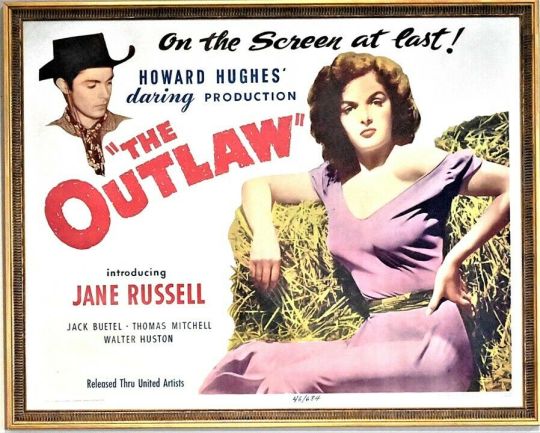
View On WordPress
1 note
·
View note